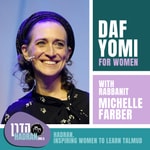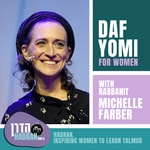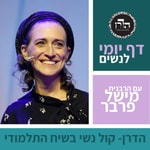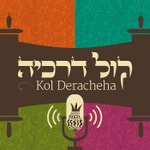Daf Yomi for Women - Hadran – Details, episodes & analysis
Podcast details
Technical and general information from the podcast's RSS feed.

Daf Yomi for Women - Hadran
Michelle Cohen Farber
Frequency: 1 episode/1d. Total Eps: 2057

Recent rankings
Latest chart positions across Apple Podcasts and Spotify rankings.
Apple Podcasts
🇨🇦 Canada - judaism
31/07/2025#17🇬🇧 Great Britain - judaism
28/07/2025#79🇬🇧 Great Britain - judaism
22/07/2025#94🇬🇧 Great Britain - judaism
16/07/2025#82🇬🇧 Great Britain - judaism
11/07/2025#88🇩🇪 Germany - judaism
07/07/2025#98🇩🇪 Germany - judaism
06/07/2025#71🇩🇪 Germany - judaism
05/07/2025#61🇬🇧 Great Britain - judaism
03/07/2025#100🇬🇧 Great Britain - judaism
02/07/2025#87
Spotify
No recent rankings available
Shared links between episodes and podcasts
Links found in episode descriptions and other podcasts that share them.
See allRSS feed quality and score
Technical evaluation of the podcast's RSS feed quality and structure.
See allScore global : 53%
Publication history
Monthly episode publishing history over the past years.
Bava Batra 68 - September 1, 28 Av
dimanche 1 septembre 2024 • Duration 47:07
Today's daf is sponsored by Rikki and Alan Zibitt in loving memory of Rikki's father, Mickey Carlin, Shevach ben Avraham z"l on his 20th yahrzeit. "We miss his energy, his vibrant smile, and his fierce love of his children and grandchildren. May his neshama have an aliya."
Today's daf is dedicated to all the teachers and students returning to school!
Does the sale of an olive press include stores that sell other items and are also used for drying out sesame seeds before making sesame oil? On what does it depend? What is included in the sale of a privately owned city? Are Caananite slaves considered like land or movable property? Can we derive an answer to that question from the Mishna? Rabban Shimon ben Gamliel included a santer in the sale of a city. There are two possible definitions for a santer - either a registrar who keeps track of the boundaries of the properties or fields outside the city. The Gemara attempts to resolve which definition is right from the case of beit hashlachin mentioned in the Mishna. However, this suggestion is rejected as there are two different ways to interpret the term beit hashlachin. Another source is brought to determine the correct definition for santer, but that attempt is also rejected. Which types of enclosures for animals are included in the sale of a city and which are not? What does the sale of a field include/not include?
Bava Batra 67 - Shabbat August 31, 27 Av
vendredi 30 août 2024 • Duration 34:43
An unmarried woman whose father died can claim her dowry from up to one-tenth of the father’s estate. However, this amount can only be collected from 1/10 of the land of the father’s estate. Rav Nechemia, the son of Rav Yosef accorded a woman one-tenth of her father’s estate for her dowry and permitted the value of the estate to include moveable items that were attached to the ground as they are considered like land itself. Rav Ashi also included rental income from the father’s properties in the calculation for a daughter's dowry. If one sold a courtyard, an olive press, or a bathhouse, what items are included in the sale, and what items are not included in the sale? Rabbi Eliezer disagrees with the mainstream opinion.
Bava Batra 58 - August 22, 18 Av
jeudi 22 août 2024 • Duration 36:09
Rabbi Bena'a measured burial caves to mark the locations of the graves for reasons of ritual purity. What happened when he reached Avraham's and Adam's graves? What was he allowed to see and what was he not allowed to see? A story is told of an amgosh (a Persian priest or magician) who entered the graves of others to take things or remove bodies from the caves. In a separate story about Rabbi Bena'a, he was imprisoned by non-Jewish authorities but later released due to his great intelligence and appointed as a judge. As a judge, he critiqued some signs hung at the entrance to their city, and they incorporated his edits into the signs.
The Mishna discusses various items that may or may not create a chazaka (presumptive right) depending on various factors, including sizes - such as a gutter, the spout of a gutter, a ladder, and windows.
Bava Metzia 87 - Shabbat May 25, 17 Iyar
vendredi 24 mai 2024 • Duration 44:46
In the expanded narrative of Avraham's encounter with the angels, numerous interpretations delve into the lessons embedded within his actions, offering insights into behaviors to emulate. Regarding the consumption of produce by a worker in the field where they toil, the Mishna lays out the conditions under which such consumption is permissible. What circumstances warrant this allowance? What are the boundaries to be observed? From where in the Torah are these laws derived?
Megillah 8 - December 20, 16 Tevet
lundi 20 décembre 2021 • Duration 48:22
Today’s daf is sponsored by Yehudit Cohen in loving memory of Yitzchak Eitan ben Yehudit Shulamit.
The only difference between the one who vows not to benefit from another and one who vows not to benefit from one's food is walking within the other's territory and borrowing vessels that are not used for food preparation. Is walking through someone else's property considered a benefit, even if it doesn't bother the owner? The difference between vows of a neder and vows of a nedava and alms is in the matter of responsibility - if an animal is dead, stolen, or lost - does the one who made the vow need to bring another animal. A neder is when one says "I accept upon myself" and a nedava is when one says, "This animal will be brought." The differences between a zav who sees two discharges and a zav who sees three discharges are in the matter of bringing a sacrifice, but for other things - level of impurity and counting seven clean ones - both are the same. How does one learn these laws from the verses on the Torah in Vayikra chapter 15? The only difference between a quarantined leper (metzora musgar) who was determined not to be a leper and an absolute leper (metzora muchlat, who was determined to have leprosy) is that the musgar does not have to let his hair grow long or tear his clothes. As for the process of purification, only the muchlat needs to shave all his hair and bring the birds. From where in the verses are there laws derived?
Megillah 7 - December 19, 15 Tevet
dimanche 19 décembre 2021 • Duration 47:33
Today’s daf is sponsored by Norman Eliaser in honor of his wife, Shira Eliaser, on her birthday! “Happy birthday to Shira - my wife, favorite chevruta, and favorite teacher!"
Today’s daf is sponsored by Becki Goldstein in loving memory of her father Yoel Ben Meir Fromm. “He was a lone Holocaust survivor who although arriving in Canada with no family or emotional support at the age of 19, still believed that Hakol le tova. He dedicated his life to Torah and Gmilut Chasadim. Any advice he gave was always spiced with examples of Midrashim and Aggadot. He challenged my thirst for learning by encouraging my independent thinking. I miss his music, his nigunim, zmirot and his stories. He was my guiding light. Yehi zichru baruch.”
There were questions raised about Megillat Esther - should it be written down? If so, should it be included in the canonization of the Tanach? What other books were a subject of debate whether or not to be included? Was the Megillah said with Ruach HaKodesh, inspired by the Divine Spirit? What verses can be used to prove this? Is there a way to understand each of these verses in a different manner? How many Mishloach Manot and Matanot l'Evyonim is one required to give on Purim? Stories are told of Abaye who delivered mishloach manot for Raba and his reactions both to what Raba was sending and to Meri bar Mar who returned mishloach manot to Raba. When Abaye brought the mishloach manot to Meri, Meri offered him food and even though Abaye had left Raba's house and wasn't hungry, he ate a lot of food there. One can derive from here either that poor people are hungry and they don't even realize it or that there's always room for dessert!! There were two rabbis (brothers) who would exchange meals each year, presumably, to fulfill their obligation of mishloach manot. Rava says that one is obligated to drink on Purim until one no longer knows the difference between cursing Haman and blessing Mordechai. A story is brought of Raba and Rabbi Zeira who ate together and got drunk and Raba "slaughtered" Rabbi Zeira. The next day, he prayed for mercy and brought him back to life. The following year, he invited him again to eat together and Rabbi Zeira declined, saying that one cannot rely on miracles. Purim seudah must be eaten during the day. The next Mishna begins a set of mishnayot that compare two different things, as the previous Mishna compared Adar 1 to Adar 2. The only difference between Shabbat and Yom Tov is that on Yom Tov one is allowed to prepare food. The Gemara derives from the Mishna that one is not allowed to prepare items that facilitate the preparation of food, in which case it does not hold like Rabbi Yehuda who permits that. The only difference between Shabbat and Yom Kippur is that Shabbat is punishable by the court and Yom Kippur is punishable by God, karet. The Gemara derives from here that if there was an obligation from the melacha performed on Yom Kippur to pay someone for damages, one would be exempt on both cases based on the law of kim lei b'deraba minai, one gets only the harsher punishment, just as on Shabbat. This is in accordance with Rabbi Nechunia ben HaKane. According to the Mishna is Makkot, Rabbi Hanania ben Gamliel holds that if one receives lashes for a karet obligation in the event that there are witnesses and the person was warned, one is exempt from karet. Rabbi Yochanan claims that others disagree with him. Does this fit in with our Mishna?
Megillah 6 - Shabbat December 18, 14 Tevet
vendredi 17 décembre 2021 • Duration 43:30
Is the city Reket mentioned in Joshua 19:35 referring to Tiberias or is Chamat? Perhaps Rakat is Tzipori? What about Kineret? Rabbi Yochanan and Rava disagree about the identification of these cities. Zeira said that Kitron is Tzipori. However, since Kitron is in Zevulun’s land and Zevulun complained that they were not given good land, how could this be? Or is it just that the grass is always greener on the other side? Ekron is the city of Caesaria. It was a Roman stronghold. It is not possible for the Romans and the Jews to both be well established at the same time or both be destroyed at the same time – two different verses are brought to prove this. Drashot are brought on verses explaining conversations between Yitzchak and Yaakov with God about Esau, which is the father of Edom, from who the Romans are descended. If one says one is successful without hard work or works hard but is not successful, do not believe them. However, if one says one worked hard and was successful, that is to be believed. Is this only regarding Torah and only some type of Torah learning? Why? Can one provoke evildoers? Or should one stay away? On what does it depend? If there are two months of Adar, when do we read the Megillah – in the first month or the second? If one holds the second month and one reads it in the first and only after that, it was decided to add another month, does one need to read it again? What about other mitzvot like the four parshiot?
Megillah 5 - December 17, 13 Tevet
vendredi 17 décembre 2021 • Duration 47:43
Today’s daf is sponsored by Naomi and Adam Ferziger in honor of the engagement of their daughter Avital (a former student of Michelle’s) to Sefi Becker. Mazal tov!
Is it necessary to have ten people when reading the Megillah? Does it matter if it is read on time or not? What counts as a big city for determining the date for reading the Megillah? In the cases where the date of reading the Megillah is changed, it is only pushed earlier but other things such as Tisha B'Av which falls on Shabbat, and the chagiga sacrifice and Hakhel that fall on Shabbat get pushed offs. Why? Is it forbidden to work on Purim? Does it just depend on the custom of the place where one lives? Is Tiberias considered a walled city from the days of Joshua or not? What is the unique issue of Tiberias?
Megillah 4 - December 16, 12 Tevet
jeudi 16 décembre 2021 • Duration 47:47
Today’s daf is sponsored by Catriella Freedman in loving memory of her mother 5th Yahrzeit, Gerda Stein, Freida bat Fruma. “She died in Eretz Yisrael, the place she firmly believed was her spiritual home. I think of you every day and always hear your encouragement to pursue the intellectual and thoughtful life”.
The daf is also sponsored by Julie Mendelsohn in honor of her son who was sworn in as an Israeli air force officer today. "As usual the daf speaks to life. Not only are you now a “captain of the Army of G-d” but throughout your course you never gave up on your learning, your tefillah and your Torah lifestyle. During all of the hard training, you got up even earlier to pray, spent your free time on Shabbat learning, and were a great example for all of the other soldiers in your unit. I am so proud of you and wish you a safe and meaningful service."
There are four other laws of Rabbi Yehoshua ben Levi regarding Purim (in addition to the four mentioned at the end of Megillah 3): a list of a few cities that were walled from the time of Joshua, women are obligated in reading the Megillah as they too were part of the miracle, when Purim that falls on Shabbat, the Megillah should be studied, and the Megillah should be read both at night and in the morning. Rabbi Chanina explains why people in the villages can read on an earlier day - the rabbis were lenient with them in order to allow them to bring food and drink to the people in the cities. The Gemara asks several questions on this and reinterprets his statement to read "The rabbis were lenient with them since they brought food and drink" - meaning as a reward to them for doing this, they wanted to make their lives easier by allowing them to read it earlier on a day when they normally went to the city. If Purim falls on Friday, when do the different types of cities read the Megillah? The Mishna brings one opinion which matched Rebbi and Rabbi Yosi's opinion, however, there are two other opinions. What is the basis for each opinion? Why do we not read the Megillah on Shabbat? Two answers are brought - either so we don't accidentally carry in the public domain (as in Lulav and Shofar) or because we give charity at the same time as we read the Megillah and we can't do that on Shabbat.
Megillah 3 - December 15, 11 Tevet
mercredi 15 décembre 2021 • Duration 48:30
Today's daf is sponsored by Joel Silberstein in loving memory of Mazal Tov bat Shalom.
Several statements made in the name of either Rabbi Yirmia or Rabbi Chia bar Abba are brought. One related to the letters in the Hebrew alphabet that have a different form when they appear at the end of a word. Was that established by the Prophets? Or earlier? Another explained who first translated the Torah and the Prophets into Aramaic. Unkelos the covert translated the Torah and Yonatan ben Uziel did the Prophets. The earth shook when the Prophets were translated. Why? And why not when the Torah was translated? Why weren't the Writings translated? How could it be Unkelos was the first to translate the Torah when it appears already in a drasha on a verse from Nechemia that it was already translated then? Another statement from Rabbi Yirmia or Rabbi Chia bar Abba relates to a verse in Daniel where he saw something that other people with him did not and yet they were frightened and he was not. What exactly transpired there? What can we learn from it? From the words "mishpacha u'mishpacha" in the Megillah, we derive that families of kohanim, Levites and maamadot leave their jobs to hear Megillah. A hierarchy of mitzvot are discussed - what precedes what in terms of importance? A met mitzva, one who has died and there is no one to bury him/her. overrides everything, even a negative commandment, as human dignity overrides everything. Rabbi Yehushua ben Levi brings several statements defining what is considered a "big city" or "walled city."


